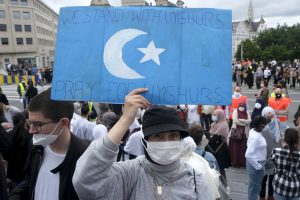I know what it means to be dislocated at the hands of an occupying armed force — the terror and pain over the loss of a homeland, the immediate urgency of staying alive, the uncertain future and the fight ahead. My family left my hometown of Ghulja, East Turkestan, in the 1970s, crossing the short border between China and Afghanistan to seek sanctuary in Kabul. Our story of exile is the story of millions of Uyghurs and the hundreds of millions of displaced people across the globe.
Uyghurs stand with Ukrainians against Russian President Vladimir Putin’s war on their precious land. We stand with Ukrainians because Uyghurs cherish freedom and understand what it takes to protect it. Uyghurs stand with Ukrainians because our authoritarian oppressor, Xi Jinping, is a key enabler in the tragedy unfolding in eastern Europe. All of us who have our liberty must do better in ending the nightmares of people under assault, wherever they are.
The images of Ukrainian resilience against Putin’s military have been an inspiration to captured peoples like the Uyghurs. Likewise, the Russian people calling for peace remind me of the bravery it takes to hold truth to formidable power. As the drumbeat to war was sounding, Western intelligence reports say Xi Jinping asked Vladimir Putin to hold off on the Ukraine invasion until the end of the Winter Olympics in Beijing. This is chilling — two world powers with nuclear weapons colluding on the timing of a war against a democratic state. If we add countries who voted “no” on a March 2 U.N. General Assembly resolution condemning Russia, such as North Korea, Eritrea, and Syria, as well as the vocal support from Myanmar for Putin, we have the formation of a “crimes against humanity coalition.”
The alleged exchange between Xi and Putin is indicative of how emboldened murderous authoritarians have become today. Let me be clear: The responsibility for war in Ukraine, and the genocide of the Uyghurs, is with the Russian and Chinese governments. No amount of ideological posturing on the “encroachment of NATO,” or “containment of a rising China” can excuse war crimes and crimes against humanity, for which Putin and Xi must answer. However, we have not acted when it was necessary. The flow of Russian and Chinese money through our economies compromised our values. When we should have been holding Russia to account for the occupation of Crimea, we made deals with Russian state-owned energy giants. When we should have been censuring China for state violence against Uyghurs, Tibetans, Southern Mongolians, Hong Kongers, and Chinese, we kept chasing deals in the Chinese labor and consumer markets.
The international community can act quickly when brutal regimes go on the offensive. The worldwide condemnation of Putin, as well as the diplomatic, economic, and cultural sanctions targeting Russia demonstrate solidarity and purpose. These measures must be consistent over time. If so, they will put Moscow under significant pressure. Since 2017, the Chinese government has been carrying out atrocities targeting Uyghurs and other Turkic peoples. In addition to mass arbitrary detention and imprisonment, China is engaging in a systematic campaign to eradicate Uyghur culture, religion, and language through policy and practice. Other abuses include widespread forced labor, enforced disappearances, and coercive birth prevention campaigns and policies. The worldwide response to China has been tepid; however, some actors from the United States to Europe have put in place limited punitive measures on Chinese Communist Party officials and Chinese companies complicit in genocide. In the U.N., action has been glacial.
The world’s response to Russia’s invasion of Ukraine, from governments to the public, has reignited the importance we place on our freedoms. We actually do care when terrible events happen in distant places. The threat to our freedoms comes from Russia, China, and the other members of the “crimes against humanity coalition.” When we speak out against tyranny that should include the wealthy apparatchiks in Beijing and the vicious generals in Myanmar. Consequently, the task before us is to be consistent in defending our freedoms by defending them wherever and whenever they are under threat — now and in the future.
Uyghurs stand with Ukrainians in a time when their bodies, nation, and values confront the weapons of Putin’s military. Whatever happens next, the world will not be the same. Uyghurs and other oppressed peoples will look for solidarity from multilateral organizations, governments, and ordinary people in their struggles, so that whatever does come next is not an age of authoritarianism. As Ukraine President Volodymyr Zelenskyy defiantly said “We are defending our independence, our state, and we will continue to do so.”

































